|
|
|
Sort Order |
|
|
|
Items / Page
|
|
|
|
|
|
|
| Srl | Item |
| 1 |
ID:
165066
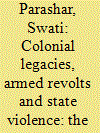

|
|
|
|
|
| Summary/Abstract |
This article examines the connected histories of armed tribal and peasant revolts in colonial and postcolonial India with reference to the ongoing Maoist conflict in rural and tribal areas of central and eastern India. The article makes two interrelated arguments about the violent continuities that endure from colonial to postcolonial contexts: (1) the nation-state system, in its efforts to establish control and influence, creates a hierarchy of citizenship engaging in the hostile policing of marginalised subjects, thereby engendering armed revolts and political violence; (2) the postcolonial state’s response to these armed revolts by marginalised subjects who challenge its sovereignty and monopoly over violence, is equally violent and repressive. Most significantly, the state’s response is legitimised in the same colonial idioms and justifications that mark epistemic and physical violence against the third world.
|
|
|
|
|
|
|
|
|
|
|
|
|
|
|
|
| 2 |
ID:
165069
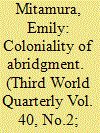

|
|
|
|
|
| Summary/Abstract |
This article examines processes of knowledge production around mass violence in 1970s Cambodia including media reportage and coeval scholarly debate, developing a conceptualisation of colonial abridgment. It assesses operations by which Cambodia as a country is violently essentialised, the occurrence of mass violence taking on metonymic grandeur that works to deny imperial legacies, entomb modern Cambodia in a hermetically sealed past and thereby maintain global order within existing racial-colonial logics.
|
|
|
|
|
|
|
|
|
|
|
|
|
|
|
|
| 3 |
ID:
165067


|
|
|
|
|
| Summary/Abstract |
The question that motivates this article is: what are the mechanisms through which the prosecution of the drug war in Latin America lead to human rights repression? In answering this question, I theorise that drug enforcement is a coalition of actors that facilitates domestic and international consensus around prohibition as a mechanism for corporate expansion. Drug war infrastructure financing is likely to facilitate the expansion of corporate investments by resource-seeking industries that require greater land use, which encroaches on the ancestral territories of indigenous peoples. And, in response to indigenous resistance to corporate appropriation of ancestral lands, resource-seeking transnational corporations will collude with private security firms and paramilitary organisations to repress and eliminate indigenous resistance. In the process of accumulating capital in Latin America, transnational corporations, domestic security, and paramilitary organizations are the drug enforcement coalition’s mediators of terror.
|
|
|
|
|
|
|
|
|
|
|
|
|
|
|
|
| 4 |
ID:
165060
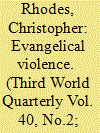

|
|
|
|
|
| Summary/Abstract |
Recognising the impact of religion on state action, this article identifies two variables that interact to affect the type and level of violence employed by Western states against Third World targets. First, variation in the degree to which the prominent Christian denominations and organisations within these states view evangelisation as either an individual-level or national-level process – Christian individualism vs Christian nationalism – has determined church support for using violence as a tactic. Second, the level of influence that churches and missionary organisations have over their home states affects the ability of Christian actors to directly impact state actions. Western violence against Third World peoples is expected to be lowest when churches and Christian organisations view evangelisation in primarily individualistic terms and have significant influence over the state. The article examines the relationships between concepts of evangelisation, Christian influence over state policies, and levels of violence against the Third World by examining British, French and German colonialism during the late colonial period of the nineteenth and twentieth centuries.
|
|
|
|
|
|
|
|
|
|
|
|
|
|
|
|
| 5 |
ID:
165061


|
|
|
|
|
| Summary/Abstract |
Modern colonialism carries many names. But ‘horror’ is not one of them. How and why is this? Why does the slaughter of the ‘native’, the ‘Indian’ and the ‘slave’ not register as crime or horror? This essay explores these questions though a close reading of philosopher Adriana Cavarero’s Horrorism: Naming Contemporary Violence. Horrorism has become an increasingly influential source for critical international scholarship concerned with broadening the frames of violence beyond those offered by strategic and legalistic lenses. Its focus on the dismemberment of the body and discovery of a new form of ontological violence offer a fruitful avenue of inquiry for theorising the wounding and violation wrought by practices of terror and counter-terror. This essay cautions against such a supposition. A close reading of the key claims and conditions of possibility of horrorism reveals it to be constituted through the erasure of colonial violence. Tracing the lineaments of this erasure shows that horrorism functions not as a sign of newness but of Western revanchism in a time of crisis. However, this does not make horrorism redundant, for it offers valuable insights for understanding the pervasive failure to consider the horrors perpetrated by the West against non-Western others.
|
|
|
|
|
|
|
|
|
|
|
|
|
|
|
|
| 6 |
ID:
165062
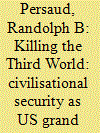

|
|
|
|
|
| Summary/Abstract |
This article disputes explanations of American expansionism that are based on the requirements of national security or more abstract theories such as the balance of power. In contradistinction to the imperatives of defence and survival, the article shows how civilisational factors weighed heavily on the emergence of US grand strategy at the turn of the nineteenth century. In particular assumptions about the peoples of the Third World being lesser played an important role in the conception and legitimation of imperial expansion. During this period, the US Navy went through a dramatic build-up. The article shows the ways in which the worldviews of many of the key players (such as Alfred Mahan and Theodore Roosevelt) contributed to the militarisation of global racism, a development that led to widespread killing in the Philippines and elsewhere.
|
|
|
|
|
|
|
|
|
|
|
|
|
|
|
|
| 7 |
ID:
165063
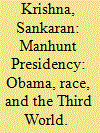

|
|
|
|
|
| Summary/Abstract |
President Obama’s commitment to a creedal narrative of American exceptionalism and his understanding of the Third World as a space of ontological deficit together made for a presidency that could neither mitigate the structural racism of the United States nor deflect a racist foreign policy premised on an unending war against terror. By examining the murders of two American teenagers – Trayvon Martin and Abdulrahman Al-Awlaki – this essay argues that the very self-fashioning narratives that propelled Obama to the presidency of the United States rendered him incapable of effecting any substantive changes in the racism than animates its domestic and foreign policies.
|
|
|
|
|
|
|
|
|
|
|
|
|
|
|
|
| 8 |
ID:
165070
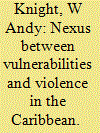

|
|
|
|
|
| Summary/Abstract |
This article analyses the nexus between the Caribbean’s manifold vulnerabilities and the direct and structural violence evident throughout the region’s history. It argues that Caribbean states are threatened not only by direct violence but also by the structural violence permeating in impoverished and marginalised sectors of the state–society complex. Both forms of violence are attributable to the historical legacy of colonisation, to US paternalism and hegemonic dominance in the post-colonial era, and to the persistence of the coloniality of power, even after Caribbean states won their independence from European imperial powers. Today, the region is, per capita, one of the most violent areas on the globe. Evidence of concatenated violence is growing across this region, demonstrating the difficulty small underdeveloped states have in addressing threats to their security, independence, economic viability, and continued existence in the intermestic environment within which they operate.
|
|
|
|
|
|
|
|
|
|
|
|
|
|
|
|
| 9 |
ID:
165059
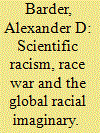

|
|
|
|
|
| Summary/Abstract |
The premise of this paper is the elucidation of a different ontology of global politics and order of the nineteenth century. International relations theory takes for granted a largely ahistorical state-centric ontology, which reifies a specific Eurocentric state and state-system as the embodiment of global politics. Instead, I focus on an alternative ontology of race, racial hierarchy and racial difference as significant for defining the content of an imperial global politics and order. My paper places into context the emergence of scientific racism and social Darwinism as key intellectual elements in defining a political imaginary that influenced the politics of difference and violence. What I show is that this intellectual history reveals a global order that was fundamentally racialised and that global violence was understood and practiced as race wars.
|
|
|
|
|
|
|
|
|
|
|
|
|
|
|
|
| 10 |
ID:
165064


|
|
|
|
|
| Summary/Abstract |
Since the Saudi-led coalition (Coalition) began its military campaign in Yemen in March 2015, upwards of 13,000 Yemen civilians have been killed, including nearly 2000 women and 3000 children. Additionally, Coalition aerial attacks have intentionally targeted Yemen’s civilian infrastructure, economic infrastructure, medical facilities and cultural heritage. Combined with the ongoing air and naval blockade, which has impeded the ability of Yemenis to access clean water, food, fuel and health services, the violence visited upon Yemen has created near-famine conditions. Furthermore, United Nations Children’s Fund (UNICEF) predicts another imminent outbreak of cholera, with the potential to be as deadly as last year’s which infected more than one million children and killed a child every 10 minutes. Through engagement with genocide studies literature, this article applies a holistic conception of genocide to the Coalition military campaign. It finds that the Coalition is conducting an ongoing campaign of genocide by a ‘synchronised attack’ on all aspects of life in Yemen, one that is only possible with the complicity of the United States and United Kingdom.
|
|
|
|
|
|
|
|
|
|
|
|
|
|
|
|
| 11 |
ID:
165058


|
|
|
|
|
| Summary/Abstract |
The decisive role violence has played in the ordering of the Third World cannot be ignored or consigned to the past. Accordingly, we argue for a more systematic and determined attention to the connections between the devastation unleashed by colonialism, imperialism, and other forms of large-scale violence in the post-independence periods. In contradistinction to situating violence in and against the Third World as a backdrop of incomplete modernization, we recognize that its proper location is in the larger dynamics of racialized and colonial international relations. The articles in this volume address these dynamics of violence.
|
|
|
|
|
|
|
|
|
|
|
|
|
|
|
|
| 12 |
ID:
165065


|
|
|
|
|
| Summary/Abstract |
United Nations agencies report that by 1998, Iraqi infant mortality had risen from the pre-Gulf War rate of 3.7% to 12%. Insufficient food and medical supplies and deterioration of sewage and sanitation systems and electrical power systems reportedly caused an increase of 40,000 deaths annually of children under the age of 5 and of 50,000 deaths annually of older Iraqis. Why is this violence on Iraqis absent from analyses of sanctions in international relations and security studies? This paper is concerned with, first, situating sanctions against the Global South as violence by challenging the conventional theorisation of violence inflicted by the hegemon as a mechanism of ‘national security’. Second, we offer a decolonial reading of the sanctions imposed on Iraq by shifting the locus of enunciation from the state to Iraqi people’s suffering.
|
|
|
|
|
|
|
|
|
|
|
|
|
|
|
|
| 13 |
ID:
165068
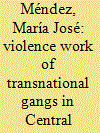

|
|
|
|
|
| Summary/Abstract |
According to international relations scholars, an important change taking place in the post-Cold War context concerns the lethality of non-state armed groups (NSAGs). Underlying this observation is the conventional assumption that non-state violence is intrinsically illegitimate. This article shifts the analysis of violence away from the terrain of legitimacy, which tends to moralise the difference between state and non-state forces, and towards the terrain of work, where their violence features as part and not separate from a shared political economy. I propose the notion of violence work as a resourceful analytic into the dialectics of everyday violence and the complex processes of value production in social life. Against the background of the extreme cruelty attributed to transnational gangs in Central America, I argue that their violence work is expressive of prevailing modes of accumulating wealth in the region. Drawing on multi-sited fieldwork in Honduras, Guatemala, El Salvador and Mexico, I show how gang violence work animates a system of economic cooperation that engages a wide array of subjects who traverse state/non-state and legal/illegal divides.
|
|
|
|
|
|
|
|
|
|
|
|
|
|
|
|
|
|
|
|
|